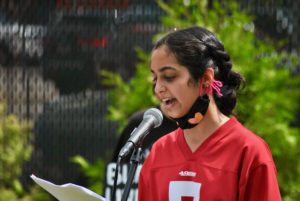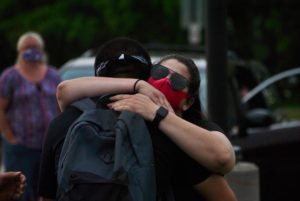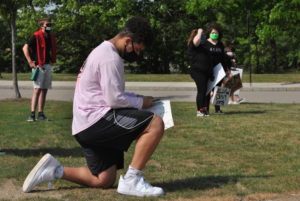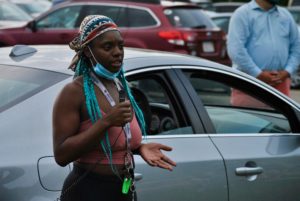By Dakota Antelman, Contributing Writer

Region – Wesley Chiu took the microphone at the end of a recent Black Lives Matter protest in Grafton.
Staring down a crowd of 100 supporters, he spoke with tears in his eyes.
“I’m a person of color,” he said, “and I’ve experienced racism more than I’d like to admit.”
Then he broke down, echoing hard, heavy sobs into the mic he still held.
Scenes like that have played out with unprecedented frequency in the wave of protests following the horrific death of George Floyd at the hands of Minneapolis police on Memorial Day.
In a movement unlike any in recent memory, large crowds are finally listening as young people of color lead difficult conversations about racism in suburbia.
First and foremost, teens say that conversation involves confronting ugly truths.
“This is a small community and we know everybody but the police still treat us like outsiders,” said Yene Ouattara, a protester gathered alongside Chiu and others in Grafton, on June 4. “That’s definitely not fair.”
Ouattara recounted cases where she said she and her brother, who is also Black, have both been suspiciously followed by police. That has made them uncomfortable.
Even more overtly, Ouattara said she’s heard racial slurs frequently in the community, a fact others speaking on June 4 further confirmed.
“There’s still racism here,” Souleymane Gaye said. “Everybody sees it. I know everybody sees it.”
As teens note, none of this is new. Police brutality and racial profiling have long plagued communities across the country.
The death of George Floyd, who suffocated under the knee of a police officer pinning him for nearly nine minutes, has simply brought all those issues back to the forefront of the public conscience.
“It’s really interesting to see such places actually doing this,” Stanley Mumbai, a friend of Marlborough protest organizer Vikkie Paquette, said. “This is getting to reach a breaking point.”
Though a traumatic moment in history for some, that “breaking point” has had heartwarming results for others.
In Northborough, Lisa Cederberg, the white mother of a 14-year-old Black girl said she was protesting downtown on June 5. Her daughter had initially been shy, sitting away from the roadway and not engaging.
As dozens of cars passed, almost all of them honking in support, though, Cederberg’s daughter spoke up.
“Wow,” she said. “It’s good to be Black.”
“She felt a sense of pride,” Cederberg elaborated. “And that was such an amazing thing.”
Still, for all the success, pride and groundbreaking nature of these protests, the people of color making their voices heard say their towns still have challenges to confront.
“We should be feeling like a part of society,” Ouattara said. “But we don’t.”
The Grafton protest she attended actually sparked a proverbial firestorm online during its planning phases as white community members questioned why such a protest was necessary. They argued that the community does not face racism and insinuated that protesters were instigating unnecessary confrontation.
One woman threatened to even attack the event, posting that she was “locked and loaded” in a statement eventually reported to Grafton police.
Such social media arguments have surrounded almost every protest in the region so far as Facebook groups have often played host to tense confrontations.
Then, there are the verbal attacks at events themselves.
Several cars whizzing by protests in Grafton, Northborough and Marlborough this week have had people leaning out windows countering protesters by screaming “all lives matter.” Some shout expletives or raise the middle finger.
In Marlborough, Derrick DeSousa said a woman screamed at him, calling him racial slurs and questioning why he was protesting at one particular event.
“This shouldn’t be a problem in today’s society,” he said. “This isn’t something we should be going through.”
Whether it’s Wesley Chiu, Yene Ouattara, Stanley Mumbai or any other members of the ever growing crowd of empowered Black, Latino and Asian young people now speaking out at protests across the region, the pained sobs and passionate calls to action are loud.
Chiu says he’s just glad communities are finally listening.
“We’re all here for the right reasons” he told another crowd in Grafton, three days after his first speech June 1. “We’re on the right track.”
(Photos by Dakota Antelman)















